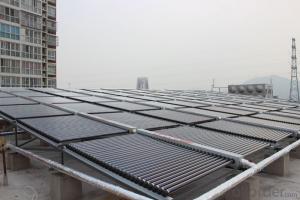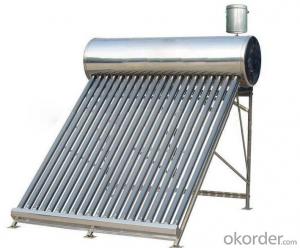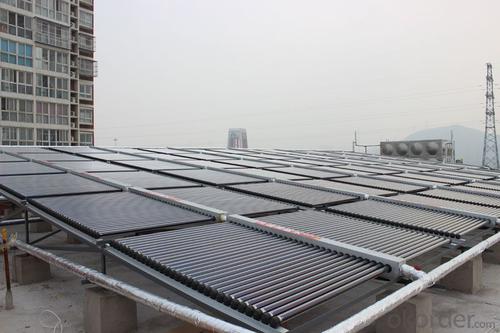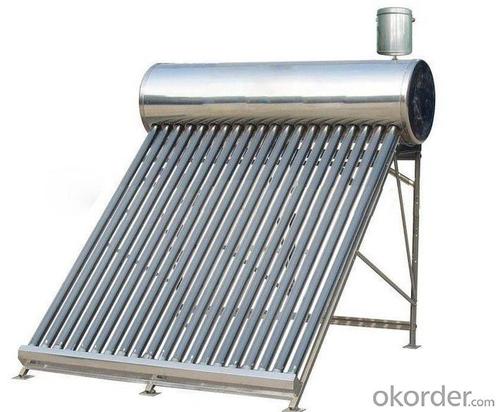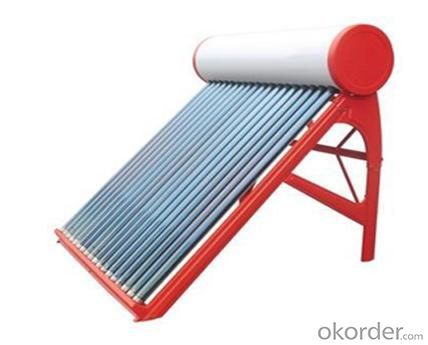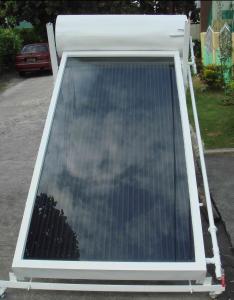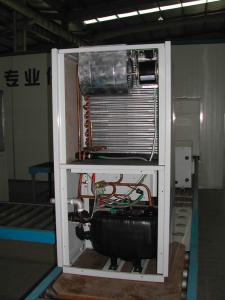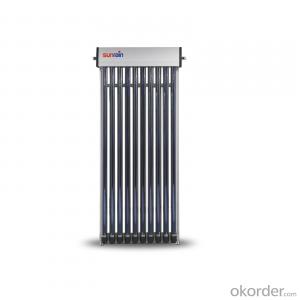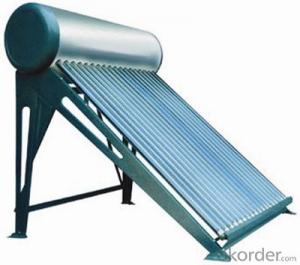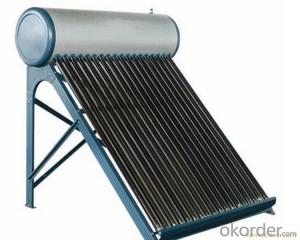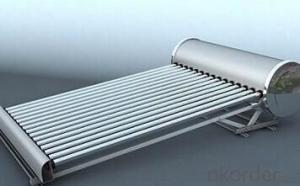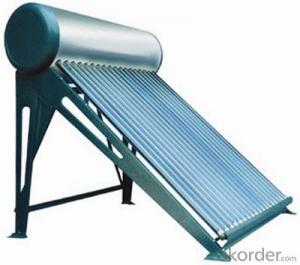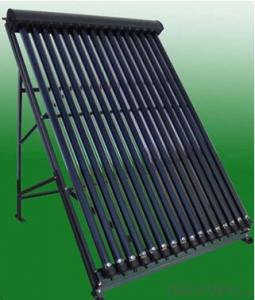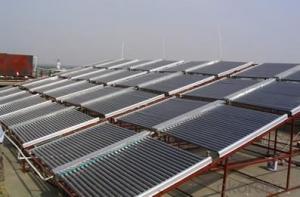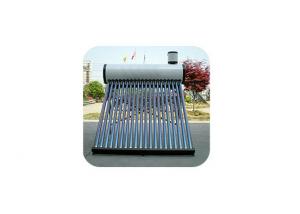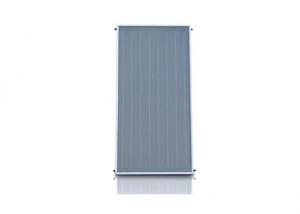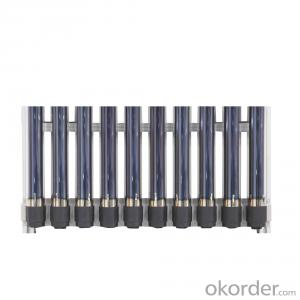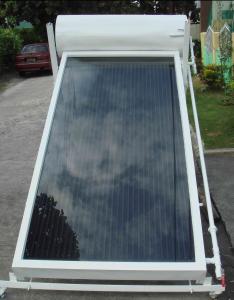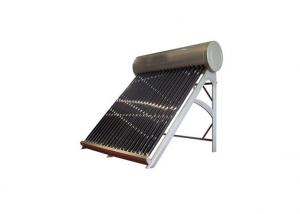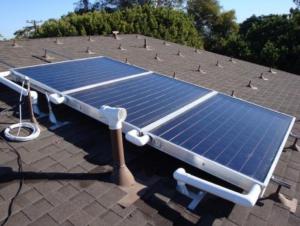150L Passive Solar Water Heater - Stainless Steel Solar Powered
- Loading Port:
- China main port
- Payment Terms:
- TT OR LC
- Min Order Qty:
- 10 set
- Supply Capability:
- 5000 set/month
OKorder Service Pledge
OKorder Financial Service
You Might Also Like
Working Principle of Domestic Solar Water Heaters:
Solar energy, in essence, is an electromagnetic wave, a type of strong optical radiation, which is produced by thermonuclear fusion reaction. The energy of the solar radiation is transmitted through the liught of different wave length. The solar water heater is designed to mainly take in the energy of visible light & near ultra red light through the selective absorbing coating of vacuum tubes.When the water in the solar collector is heated by the solar radiation, its temperature rises. As a result, the water in the solar collector and the water in the tank form natural convection because of density contrast casued by the temperature difference. So the water of the higher temperature is incessantly forced into the insulated solar water tank( As shown in the figure).
Features
<1> Imported SUS304-2B food-level stainless steel,thickness:0.31~0.5mm
<2> Outer tank: High quality stainless steel,thickness:0.31~0.5mm
<3>Insulation: 50~55mm polyurethane foam
<4> Vacuum tube: CU/SS-AL/N red tube
<5> Frame: Stainless steel/Aluminum alloy,thickness:1.2~2mm
<6> Reflector: Stainless steel/Aluminum alloy as option
<7> Available accessories: Feeding tank,solar controller,electric heater, Mag rod,thermostatic mixing valve
Specification
ITEM.NO | SPECIFICATION | EFFECTIVE LIGHT AREA | TANK'S CAPACITY | APPLICATION PEOPLE | CBM | |||
DIAMETER OF WATER TANK | QTY OF TUBE(pcs) | DIAMETER OF TUBE | LENGTH OF TUBE | |||||
Z-NS5810 | 460mm | 10 | 58mm | 1.8m | 1.04 | 100L | 4 | 0.37 |
Z-NS5812 | 460mm | 12 | 58mm | 1.8m | 1.25 | 120L | 4-5 | 0.44 |
Z-NS5815 | 460mm | 15 | 58mm | 1.8m | 1.56 | 150L | 6 | 0.56 |
Z-NS5818 | 460mm | 18 | 58mm | 1.8m | 1.87 | 180L | 7-8 | 0.64 |
Z-NS5820 | 460mm | 20 | 58mm | 1.8m | 2.08 | 200L | 8 | 0.7 |
Z-NS5825 | 460mm | 25 | 58mm | 1.8m | 2.61 | 250L | 10 | 0.89 |
Z-NS5830 | 460mm | 30 | 58mm | 1.8m | 3.13 | 300L | 12 | 1 |
Z-NS5836 | 460mm | 36 | 58mm | 1.8m | 3.75 | 360L | 14-15 | 1.3 |
Z-NS5840 | 460mm | 40 | 58mm | 1.8m | 4.17 | 400L | 16 | 1.4 |
Z-NS5845 | 460mm | 45 | 58mm | 1.8m | 4.69 | 450L | 18 | 1.6 |
Product Details Show:
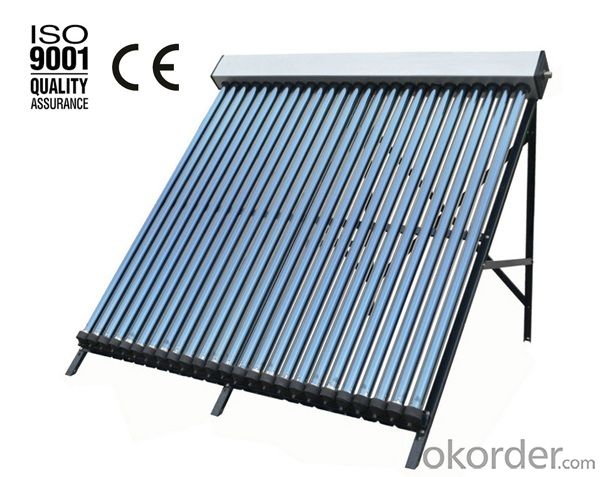
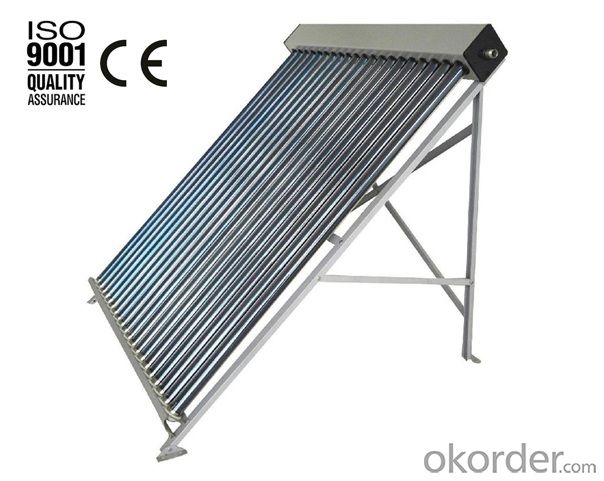
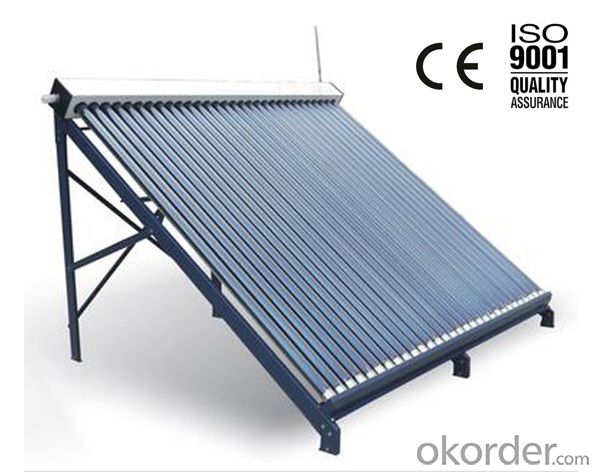
FAQ
1. Q: Are you a factory or trading company?
A: We are a factory. Especially for Solar Controller, PWM solar controller 50A12V/24V
2. Q: Where is your factory located? How can I visit there?
A: Our factory is located in Guangzhou, China. You are warmly welcomed to visit us!
3. Q: what other product you have except such Solar Lighting?
A: We have poly ,mono cells and panels. Off grid solar system, like off grid solar inverter, pure sine wave inverter, solar collector, solar controller, solar charger, Portal solar system, battery, DC Fan, Solar Led Light.
4. Q: Can the price be cheaper?
A: Of course, you will be offered a good discount for big amount.
5. How can I get a sample?
A: Please call us or send email for asking the samples.
- Q: What is the difference between active and passive solar water heaters?
- Active and passive solar water heaters are two different types of systems that harness solar energy to heat water. The main difference between them lies in how they circulate the water and transfer heat. Active solar water heaters utilize pumps or other mechanical devices to circulate water through the system. These systems typically consist of solar collectors, storage tanks, and controls. The solar collectors, usually mounted on the roof or a nearby area with ample sunlight exposure, absorb the sun's heat and transfer it to the water. The heated water is then pumped into a storage tank, where it can be used for various purposes. Active systems are more complex and require electricity to operate the pumps, but they tend to be more efficient and can provide a continuous supply of hot water. On the other hand, passive solar water heaters rely on natural convection and gravity to circulate water without the need for mechanical components. They usually consist of a solar collector and a storage tank, but without any pumps or controls. The solar collector absorbs heat from the sun, and as the water inside it heats up, it naturally rises into the storage tank due to the difference in density. As hot water is drawn from the tank, cold water is pulled down into the collector, creating a continuous flow. Passive systems are simpler and don't require electricity, but they may not be as efficient as active systems and may have limitations in terms of the amount of hot water they can provide. In summary, the main difference between active and passive solar water heaters is the method of water circulation and heat transfer. Active systems use pumps and controls to circulate water and offer higher efficiency, while passive systems rely on natural convection and gravity for circulation and are simpler but potentially less efficient. The choice between the two depends on factors such as budget, energy requirements, and available space.
- Q: How does the angle and orientation of solar panels affect the performance of a solar water heater?
- The angle and orientation of solar panels greatly affect the performance of a solar water heater. The angle determines the amount of direct sunlight the panels receive, and an optimal angle ensures maximum energy absorption. The orientation, preferably facing south in the northern hemisphere and north in the southern hemisphere, allows for better exposure to sunlight throughout the day. These factors combined significantly impact the efficiency and effectiveness of the solar water heater in converting solar energy into heat.
- Q: Can a solar water heater be used to provide hot water for a large number of people?
- Yes, a solar water heater can be used to provide hot water for a large number of people. Solar water heaters are designed to harness the sun's energy to heat water, making them an environmentally friendly and cost-effective solution for large-scale hot water requirements. By installing multiple solar water heaters or using larger capacity systems, it is possible to meet the hot water demands of a large number of people efficiently and sustainably.
- Q: Does a solar water heater require regular maintenance?
- Yes, a solar water heater does require regular maintenance. This includes checking and cleaning the solar panels, inspecting and replacing any worn-out components, ensuring proper insulation, and flushing the system to remove any sediment build-up. Regular maintenance helps to ensure optimal performance and prolong the lifespan of the solar water heater.
- Q: Can a solar water heater be used in areas with limited ground space?
- Yes, a solar water heater can be used in areas with limited ground space. There are various types of solar water heaters available, including compact and space-saving designs that can be installed on rooftops or walls. These systems utilize the available vertical space to capture sunlight and heat water, making them suitable for areas with limited ground space.
- Q: What are the common maintenance tasks for a solar water heater?
- Some common maintenance tasks for a solar water heater include checking and cleaning the solar panels, inspecting and replacing any damaged or worn-out components, monitoring and adjusting the system's fluid levels, and testing the pressure relief valve. Additionally, it is important to regularly check the system for any leaks or signs of corrosion, and to ensure that all connections and valves are tight and functioning properly.
- Q: How does the tilt angle of the solar collector affect the performance of a solar water heater?
- The tilt angle of the solar collector has a significant effect on the performance of a solar water heater. The tilt angle determines the amount of solar radiation that the collector can capture effectively. Ideally, the optimal tilt angle of a solar collector should be equal to the latitude of the installation location. This allows the collector to receive maximum solar radiation throughout the year. However, this may not always be feasible due to various factors such as aesthetics, space constraints, or building restrictions. When the tilt angle of the collector is set at an optimal angle, the solar water heater can maximize its energy absorption and conversion efficiency. This means that more solar radiation is captured, resulting in higher water temperatures and increased overall performance. If the tilt angle is too steep, the solar collector may receive too much solar radiation during peak hours, causing the system to overheat and potentially reduce its efficiency. On the other hand, if the tilt angle is too shallow, the collector may not receive enough solar radiation, resulting in lower water temperatures and reduced performance. The tilt angle of the solar collector also affects the performance seasonally. For example, in winter months when the sun is lower on the horizon, a steeper tilt angle can help capture more sunlight. In contrast, during summer months when the sun is higher, a shallower tilt angle can be more effective. It is important to note that while the optimal tilt angle can significantly improve the performance of a solar water heater, other factors such as shading, orientation, and the quality of the collector itself also play crucial roles. Therefore, a careful analysis of these factors should be considered when determining the most suitable tilt angle for a solar water heater installation.
- Q: What is the difference between passive and active solar water heaters?
- Passive and active solar water heaters are two distinct types of systems employed for utilizing solar energy in heating water. Their dissimilarities primarily lie in their mechanism and complexity level. Passive solar water heaters depend on natural convection and gravity for the circulation of water within the system. Typically, they comprise a storage tank positioned above the solar collectors, which absorb sunlight and warm the water. As the hot water rises, it effortlessly moves into the storage tank, while colder water replaces it at the bottom of the collectors. Due to the absence of mechanical pumps or controls, passive systems are simpler and generally more cost-effective to install and maintain. However, their efficiency may be comparatively lower than active systems, especially in regions with limited sunlight or during colder climatic conditions. On the contrary, active solar water heaters make use of pumps or other mechanical devices to circulate water between the solar collectors and the storage tank. These systems are more intricate and necessitate additional components like sensors, controllers, and pumps to regulate water flow and optimize heat transfer. Active systems are usually more efficient and capable of providing a greater amount of hot water, rendering them suitable for larger households or commercial applications. Nonetheless, they generally entail higher installation and maintenance costs due to the added equipment and energy requirements. To summarize, the primary distinction between passive and active solar water heaters lies in the complexity level and the requirement for mechanical components. Passive systems rely on natural convection, whereas active systems employ pumps and controls for water circulation. Passive systems are simpler and more cost-effective, although they may exhibit lower efficiency, while active systems are more complex, efficient, and suitable for larger-scale applications. The choice between the two depends on factors such as budget, available sunlight, and hot water demand.
- Q: Can a solar water heater be used in areas with limited access to suitable installation sites or roof space?
- Yes, a solar water heater can be used in areas with limited access to suitable installation sites or roof space. In such cases, alternative installation options such as ground-mounted solar water heaters or solar panels placed on walls or other structures can be considered. Additionally, compact or space-saving designs are available that can be installed in smaller areas.
- Q: How does a solar water heater perform in areas with high levels of air humidity?
- A solar water heater can still perform effectively in areas with high levels of air humidity. While humidity may slightly decrease the overall efficiency of the system, it does not completely hinder its performance. The solar collector can still absorb sunlight and convert it into heat energy, which is then used to heat the water. However, it is essential to properly maintain and clean the system regularly to prevent any potential issues caused by moisture or humidity.
Send your message to us
150L Passive Solar Water Heater - Stainless Steel Solar Powered
- Loading Port:
- China main port
- Payment Terms:
- TT OR LC
- Min Order Qty:
- 10 set
- Supply Capability:
- 5000 set/month
OKorder Service Pledge
OKorder Financial Service
Similar products
Hot products
Hot Searches
Related keywords
